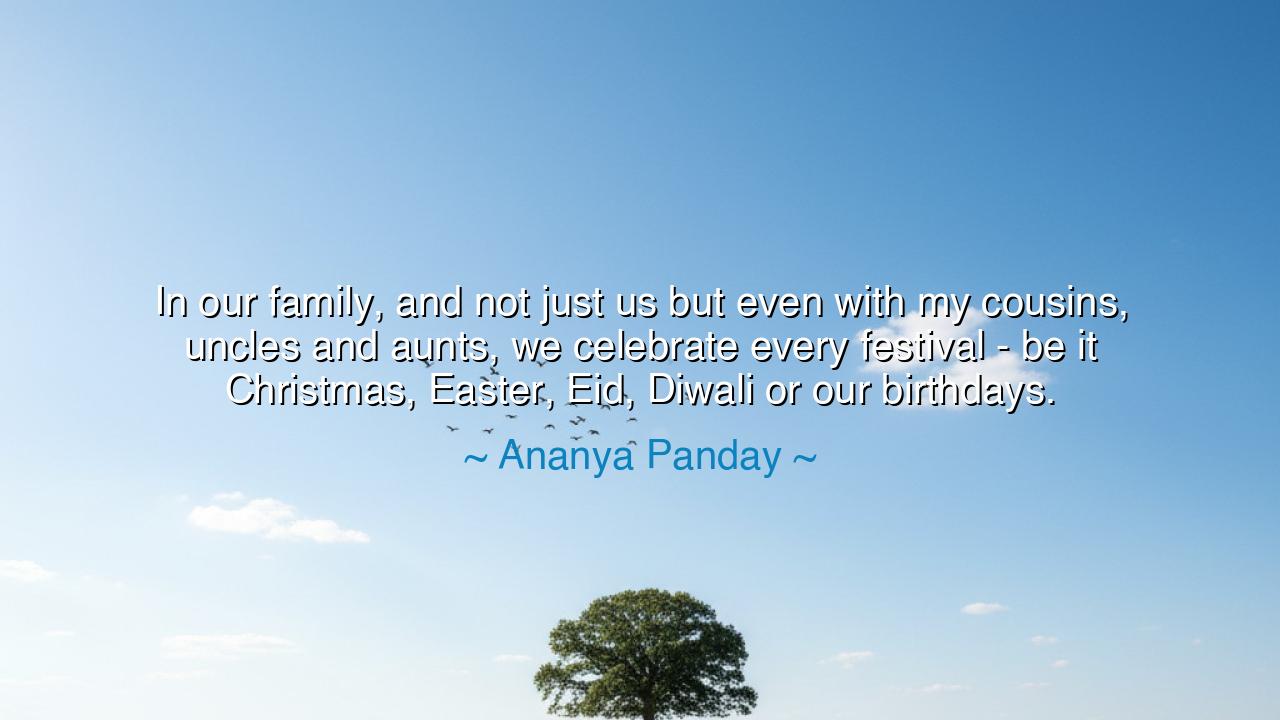
In our family, and not just us but even with my cousins, uncles
In our family, and not just us but even with my cousins, uncles and aunts, we celebrate every festival - be it Christmas, Easter, Eid, Diwali or our birthdays.






In the gentle and radiant words of Ananya Panday, we hear a truth that transcends creed and border, reaching into the eternal heart of humanity itself: “In our family, and not just us but even with my cousins, uncles and aunts, we celebrate every festival – be it Christmas, Easter, Eid, Diwali or our birthdays.” Though spoken simply, these words carry the fragrance of harmony, the light of unity, and the wisdom of coexistence. They speak of a spirit that recognizes joy as a universal language — that beyond the names and symbols of faith, there lies a shared human longing to gather, to rejoice, and to give thanks for life.
To understand the origin of this thought, we must look not only to the young actress who uttered it, but to the land that shaped her — India, the ancient confluence of countless cultures, religions, and languages. For thousands of years, India has been a living mosaic where the sacred and the secular intertwine — where lamps are lit for Diwali, prayers are sung for Eid, hymns are offered for Christmas, and colored powders fill the air during Holi. Within this vast symphony, Panday’s family stands as a reflection of the nation’s deeper truth: that diversity is not a division but a celebration, and that every festival, regardless of its faith, holds a spark of the same divine flame. Her words remind us that when families celebrate together — not as Hindus or Muslims or Christians, but as humans — they become mirrors of peace in a world that often forgets how to love across difference.
This spirit of universal celebration has long been known to the wise. In the ancient courts of Emperor Akbar, the Mughal ruler of India, all faiths were honored. The emperor, though born into Islam, invited sages, priests, monks, and scholars of every religion to his palace in Fatehpur Sikri, where they discussed truth not as rivals, but as seekers. He understood that the essence of all festivals — whether it be the birth of Christ, the breaking of the Ramadan fast, or the lighting of the Diwali diya — is the triumph of light over darkness, of love over hatred. What Ananya Panday describes within her family is the same vision Akbar once dreamed for his empire — a family of faiths, united not by sameness, but by mutual reverence.
In a world often torn by divisions of belief, her statement gleams like a quiet lamp in the dusk. It reminds us that festivals are not owned by religion alone — they are the inheritance of humanity. For what is a festival, if not a moment when the soul pauses to give thanks, to share food, to laugh, and to remember that life itself is sacred? Whether one calls it Christmas or Eid, Diwali or Easter, the essence remains the same: the lighting of joy against the darkness of despair, the renewal of faith, and the reaffirmation that we are one family under heaven. To celebrate all festivals, as her family does, is to live as if the world were one home — many rooms, one roof, many songs, one melody.
History gives us many examples of this spirit of inclusiveness. In modern times, one might recall the great Mahatma Gandhi, who attended prayers from every religion and declared that his religion was truth itself. He said, “Religions are different roads converging to the same point.” To live as Ananya Panday describes is to walk those roads with open arms — to honor each as sacred, without losing one’s own. And indeed, the power of such living lies not in grand gestures but in small acts: sharing sweets at a neighbor’s festival, lighting a candle for another’s holy day, or offering a blessing without regard for faith. In these gestures, humanity rediscovers its unity.
The meaning of Panday’s words reaches far beyond her family gatherings; it is a message for an age that too often defines itself by difference. Her celebration of all festivals is a metaphor for a larger truth — that every culture, every belief, is a petal in the same cosmic flower. When one petal withers, the beauty of the whole diminishes. But when all are cherished, the bloom endures. The lesson, therefore, is not simply to tolerate, but to rejoice in diversity — to see in every festival an invitation to understand another soul, to widen the circle of empathy, and to recognize that joy multiplies when it is shared across boundaries.
The lesson we may draw is both simple and profound: celebration is the purest form of unity. When we gather for each other’s holy days, we teach our children that love is larger than fear, that belonging is deeper than belief, and that no one faith can contain all of truth’s light. To follow this path, one need not abandon their tradition; one need only open their heart. Attend your neighbor’s feast, light a candle on their holy night, or speak a word of peace in their tongue. For in doing so, you do not lose your faith — you fulfill it.
So let Ananya Panday’s words echo like a song across generations: that in the great family of humanity, every day can be a festival, and every home a temple of joy. Let us build such families — where laughter knows no boundary, where prayer wears many names, and where the light of one celebration becomes the light of all. For when we learn to celebrate together, the world itself becomes holy, and the greatest religion of all — the religion of love — shines forth in every heart.






AAdministratorAdministrator
Welcome, honored guests. Please leave a comment, we will respond soon